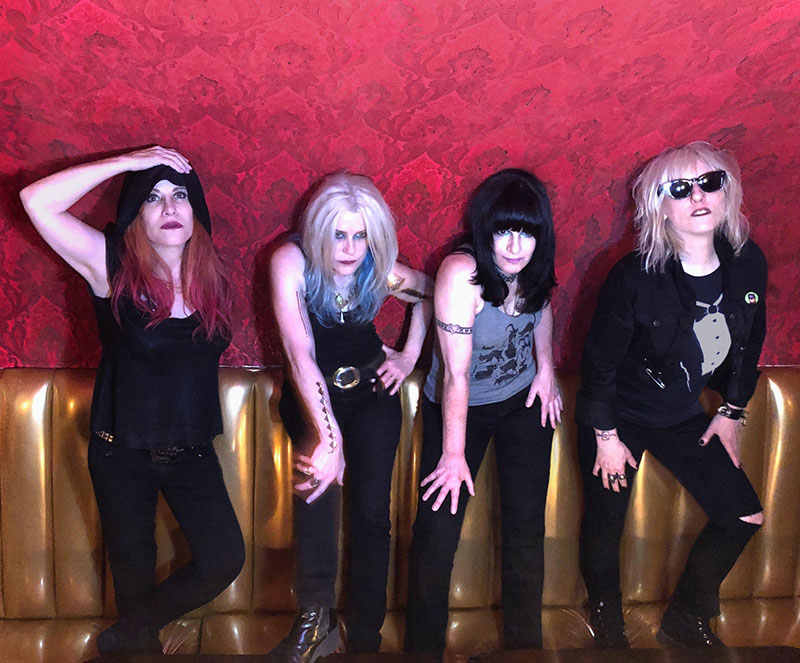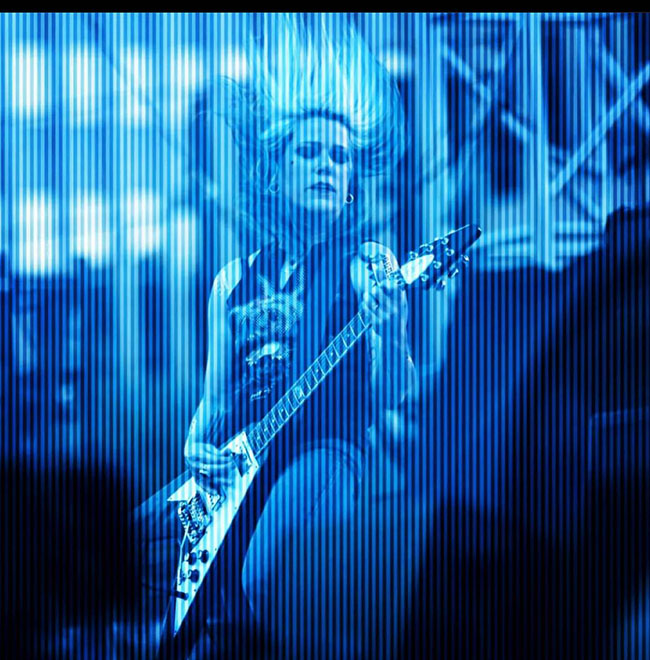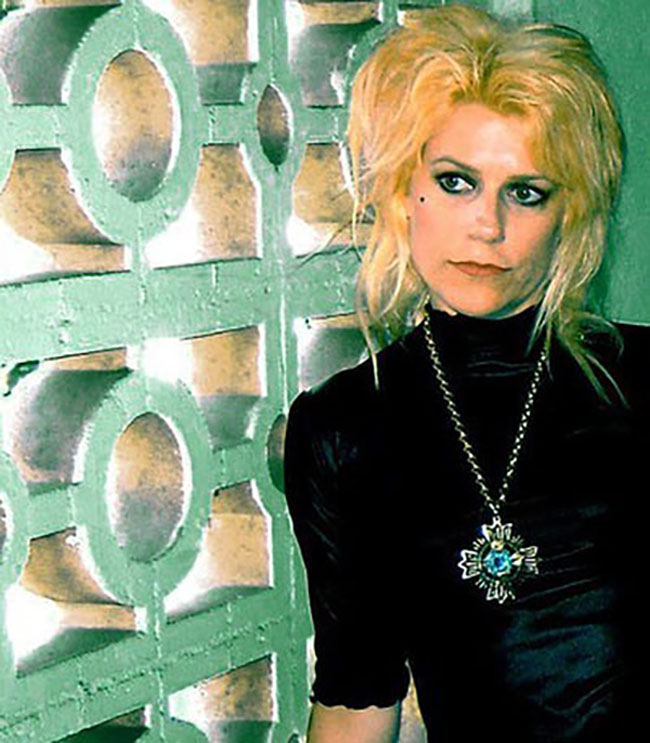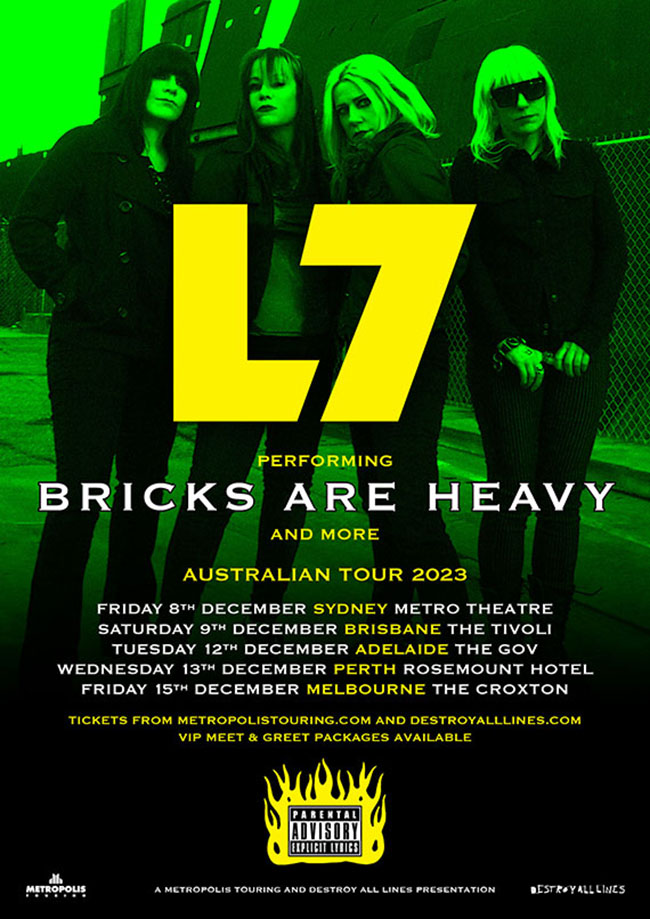 Robert Fagan photo.
Robert Fagan photo.
By tragic coincidence, a few hours before my interview with L7 guitarist and singer Donita Sparks, news broke of the passing of Irish musician and songwriter, Sinead O’Connor.
At first glance, the association between L7 and O’Connor is opaque: L7 was a hard-rocking, all female rock’n’roll band who emerged from Los Angeles; O’Connor was a talented singer and songwriter from Ireland, whose angelic voice belied her outspoken views on religious dogma and practice.
But on a cold evening in October 2009 at the Myer Music Bowl in Melbourne, O’Connor had taken to the stage as part of the Melbourne Music Festival’s “Seven Songs to Leave Behind” to belt out a mesmerising version of L7’s “Shitlist” – a track which O’Connor had chosen, per the structure of the evening for the various guest performers featured, as the song she’d wished she’d written.
“You saw that live? Oh my god, that’s so great,” Sparks says. “I’ve seen the footage and I even posted it to our Facebook page one time.
“Strangely, we had just contacted her management to see if we could use that recording. We’re working on a tribute record and we thought it would be a gas to use that version with her doing ‘Shitlist’ with the full orchestra.
“They were getting back to us, just a week ago. They hadn’t heard from Sinead in a while, so then to hear this this morning was very sad. She was a right-on person. She had troubles of course, but she stuck her neck out for the oppressed and her career suffered for it. We really respect the hell out of her.”
Twenty years earlier, just when O’Connor was coming into wider public prominence, L7 was moving out the dark shadows of the LA punk rock scene and looking to catch a ride on the alternative-grunge wave that was sweeping through the music industry in the early 1990s.
Sparks had grown up in Chicago, and as a teenager had borrowed her sister’s ID to travel to punk and new wave dance clubs on Chicago’s north side.
“I really liked to dance. I saw concerts too, but mostly small clubs,” Sparks says. “I saw Iggy at small clubs, I saw The Ramones at small clubs. Most of the time I would go into the city to see bigger bands like B52s. I wasn’t seeing a lot of Chicago punk bands. When punk turned hardcore, I lost interest in it.”
By early 1983, Sparks had moved across the country and settled in LA: “The LA first wave was dying out, or they were getting huge, like The Go Gos and X. They weren’t really on the scene anymore, they were out touring, playing big places.”
 Live Donita photo by @anne_sequinworld.
Live Donita photo by @anne_sequinworld.
Sparks got a job at the LA Weekly, where future LZ guitarist Suzi Gardner had worked previously.
“So we met the same people there. Some of them were college grads who were writers and some of them were musicians or had a band or were into art performance.”
Sparks teamed with Gardner to form the genesis of L7, enlisting bassist Jennifer Finch and, eventually, drummer Dee Plakas, to establish the classic L7 line-up.
Consciously or not, L7 projected a visual and performance aesthetic that could be traced back to the ‘80s LA art performance scene.
“I think we looked pretty cool but that’s just how we looked,” Sparks says. “All of us have looked different in different periods of our ‘punkhood’. In the late 70s we all had short hair. It’s not like we came out of the womb wearing motorcycle boots and flannelette shirts. That was something that we helped create.
We always had more of a punk visual aesthetic that a lot of the other ‘grunge’ bands. We had a bit more of a mash-up thing going on, biker ironic, pop culture references, little bit of Ramones, little bit of Hell’s Angels, and a little bit of humour. A band with a visual style is a plus. It’s not something we planned it, it was just organic, it was an evolving look.”
In 1991, L7 played the International “Pop Underground Festival” in Olympia, Washington, where they met Fugazi, who were also on the bill. Fugazi would become one of L7’s most committed champions. By this time, after a couple of years with SubPop, L7 signed with the legendary Slash Records, giving the band access to parent company Warner Records’ extensive distribution network.
“Around that time a lot of bands trends were ready to move on from the underground to try and get more coverage,” Sparks says.
“That was the trend, majors were signing bands from the underground. Nirvana’s success was helping to break that, it was the thing to do. We loved SubPop, but we’d play towns and our records weren’t in the stores, and that was getting frustrating. So we had some more opportunities with a major label.”

L7’s first album with Slash, “Bricks Are Heavy”, released in 1992, became the band’s most successful and, to this day, most notable release. While some artists struggled with the transition from DIY to commercial and its attendant step change in expectations, Sparks says L7 embraced the band’s new found environment.
“I liked the move because I wanted to be in people’s homes,” Sparks says. “My only problem was that we didn’t get mainstream enough. We didn’t get as much coverage as Nirvana, but we got some coverage.
“I liked blowing people’s minds, personally, and I like getting in people’s living rooms, on MTV. That’s what saved me when I was a kid, seeing Bowie on the Merv Griffin Show or the Dinah Shore Show. So I had no problem going from the underground.
“I don’t think The Beatles had a problem with it, I don’t think the Stones had a problem with it, I don’t think Bob Dylan had a problem with it, so why should I have a problem with it? I’m not holier than thou, I guess. Get me on the air, that’s all I have to say!”
L7 eventually called it a day in 2001, five years after Finch’s departure, and two years after releasing their sixth album, “Slap-Happy” on their own Wax Tadpole Records. Almost 15 years later, L7 decided to reform, embarking on European and US tours with the Sparks-Gardner-Finch-Plakas line-up. While L7 had buckled previously under the weight of personality differences, this time around the band members chose to ignore the past and just move on.
“We discussed nothing about the past!” Sparks laughs. “If you want to have a reunion, don’t drudge up the past and just move forward. You need a goal and our goal was to reconnect with our fans, remind people of who we were and are and to get back together playing music, because we were a very good unit together.
“And even though some of us had our own solo projects which were cool, the band L7 was the biggest success in our lives, career-wise. So don’t bring up the past. Don’t ask, don’t tell! Move on down the line! That’s how we did it.”
It's a pragmatic attitude that comes to the fore when I ask Sparks to reflect on what she’s learnt about playing in a band, 40 years after first stepping on stage.
“Everyone comes from different backgrounds. Even though we’re all white females who grew up in the suburbs, but we’ve got very different family stories, some rougher than others. Different personalities,” Sparks says.
“You’re never going to change a personality but you can accept a person’s weaknesses, strengths, recognise their strengths, overlook their weaknesses, try to move on down the line with it, not harp on it like maybe you did in the past.”

L7 is still a going concern – the band has released its first new album in 20 years, “Burn Baby”, in 2019 – but “we’re not a full-time year round band, like we were in the 90s,” Sparks says.
“We get together, we tour, we do some writing and then we’re all off in our own worlds. Back in the 90s we were around each other 24/7 and that does start to drive you crazy. But now we have our own lives and we get together for the rock, to rock out for people, to enjoy the experience without the fatigue of having personality crisis with each other. That’s my 2c on that.”
Ross Knight from Cosmic Psychos is on record saying the best advice he can give a band is to have a job outside of playing rock’n’roll – in that way an act can have respite from the fear and loathing of the rock’n’roll world, plus Knight opines, you can write songs about how shit your job is.
“That’s great!”, Sparks laughs. “Ross is a very wise man. That guy is salt of the earth, he’s funny, he’s with it and he works really hard and his band rocks. And he’s handsome, isn’t he? We love Ross a lot!”
L7 2023 Australian
and NZ Tour
DEC
"Wednesday 6 - Auckland, Powerstation
Friday 8 - Sydney, Metro Theatre
Saturday 9 - Brisbane, The Tivoli
Tuesday 12 - Adelaide, The Gov
Wednesday 13 - Perth, Rosemount Hotel
Friday 15 - Melbourne, Croxton Bandroom

